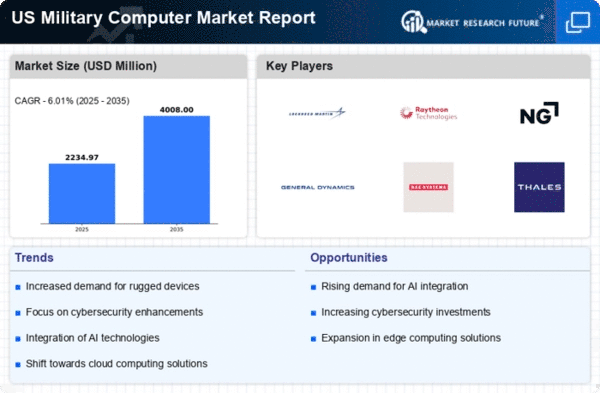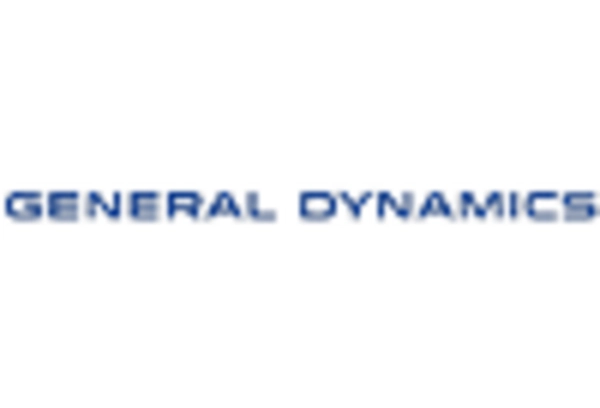Increased Defense Budgets
This sector is significantly influenced by the increasing defense budgets allocated by the US government. In recent years, there has been a notable rise in funding for defense-related projects, which includes investments in advanced computing technologies. The fiscal year 2025 defense budget proposal indicates an allocation of over $800 billion, with a substantial portion earmarked for modernization efforts. This financial commitment is likely to enhance the procurement of military computers, as the armed forces seek to upgrade their technological capabilities. As a result, the military computer market is expected to benefit from this influx of capital, facilitating the development and deployment of state-of-the-art computing solutions that meet the evolving needs of military operations.
Growing Demand for Data Security
The military computer market is increasingly driven by the growing demand for data security and protection against cyber threats. As military operations become more reliant on digital systems, the need for secure computing environments has never been more critical. The military is investing heavily in cybersecurity measures to safeguard sensitive information and maintain operational integrity. This focus on data security is reflected in the rising expenditures on secure military computing solutions, which are projected to account for a significant share of the overall market. In fact, estimates suggest that cybersecurity-related investments in the military computer market could reach $15 billion by 2026, highlighting the urgency of addressing potential vulnerabilities and ensuring the resilience of military operations.
Advancements in Military Technology
The military computer market is experiencing a surge due to rapid advancements in military technology. Innovations in hardware and software are enhancing the capabilities of military computers, making them more efficient and effective in various operations. The integration of high-performance processors and advanced graphics capabilities allows for real-time data processing and analysis, which is crucial for mission success. Furthermore, the military's increasing reliance on unmanned systems and autonomous vehicles necessitates robust computing solutions. According to recent estimates, the military computer market is projected to grow at a CAGR of approximately 5.5% over the next five years, driven by these technological advancements. This growth indicates a strong demand for cutting-edge military computing solutions that can support complex operations and improve overall mission readiness.
Emergence of Cloud Computing Solutions
The military computer market is witnessing a transformative shift with the emergence of cloud computing solutions. The adoption of cloud technologies enables military organizations to enhance their operational efficiency and data management capabilities. By leveraging cloud infrastructure, military units can access and share critical information in real-time, facilitating better decision-making and coordination during missions. This trend is particularly relevant as the military seeks to streamline its operations and reduce costs associated with traditional computing systems. The cloud computing segment within the military computer market is expected to grow substantially, with projections indicating a potential increase of 20% in market share over the next few years. This growth underscores the importance of cloud solutions in modernizing military computing capabilities.
Focus on Interoperability and Integration
The military computer market is increasingly characterized by a focus on interoperability and integration among various systems and platforms. As military operations become more joint and coalition-based, the need for seamless communication and data exchange between different branches of the armed forces is paramount. This emphasis on interoperability drives the demand for military computers that can integrate with existing systems and facilitate collaboration across diverse platforms. The military is actively pursuing initiatives to standardize technologies and ensure compatibility, which is likely to enhance the overall effectiveness of military operations. Consequently, the military computer market is expected to see a rise in demand for integrated solutions that can support multi-domain operations and improve situational awareness.
















